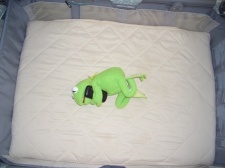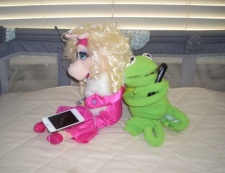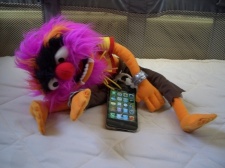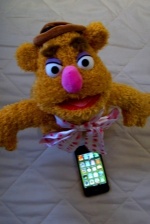Written by Tiffany Lawson Inman
Emotions play a big role in writing fiction.
That’s not a big secret, right?
Nope, but what I say next might surprise you. One of the many things I learned during my years as an actor is that most people, including writers, are afraid of their own emotions. Feeeeeeeeeeelings. Oh yes, those pesky feelings.
Oh yes, those pesky feelings.
Most people are afraid of the thoughts and situations that forced them to feel hate, shame, guilt, terror, deep sadness, and dread. Humans are blessed to have the ability to emote, but they also have within them an emotional barrier to protect them from feeling some of those nasty things. It also protects them from revisiting past emotions. Unfortunately this emotional barrier makes emotions one of the most difficult area of fiction to write.
I say most people because it seemed that all of us crazies that were in the theatre field were only mildly afraid of our emotions. Mildly afraid and wildly fascinated. Any scene or play I came across that would allow me to crack open my psyche, I dove after it with open arms. I knew it was an opportunity to really dig in and polish my craft. Actors relish the chance to explore the demons inside of their brains, hearts, and blood. Because actors know THAT is where the drama is. That is what the audience wants to see. And as an actor, writer, or any other type of artist, if you can’t manipulate your emotional barrier you won’t be making true dramatic art.
Really, is that all?
Nope. Writers also have a thread of fascination with crossing this emotional barrier, however, in all of the books and manuscripts I’ve read, I’ve only seen a handful of authors create true emotion. Many get close. Even more miss the mark and are completely disconnected from their emotions.
The emotional barrier is tall and wide. It has thorns that pierce flesh. It has poison that can flow into your bloodstream and taint the day, week, year after you dare to cross through it. There is no wonder why most people are very comfortable leaving it up for protection.
A few years ago I created an online course to help writers find their way through the emotional barrier and use what they find to fuel more dramatic writing using The Method.
Yesterday I cracked open a book on writing craft to gather inspiration for this post and I was more than pleasantly surprised to see Donald Maass also touching on the subject of human emotions in his book Writing 21st Century Fiction. He asks writers in the beginning of Chapter Three,
“But what is it that moves readers’ hearts? What conjures in readers’ imaginations a reality that, for a while, feels more real that their own lives? What glues readers to characters and makes those characters objects of identification: people with whom readers feel intimately involved about whom they care, and whose outcomes matter greatly?
Emotions.”
He later goes on to say:
“…some writers slide into genre clichés or literary imitation. To put authentic emotions on the page, you need to own them. When you do, readers will respect you. It’s when you hide that readers feel shortchanged, cheated, and only minimally involved.”
Well gosh, we don’t want to cheat or shortchange our readers. And we definitely don’t want to become cliché or just another Joe Writer. That won’t sell books.
As an editor I want writers to be proud of their product and as a reader I want to fall in love with fiction every time I read a book. Maass makes a great point and that is exactly what I was referring to when I mentioned feeling disconnected from a character’s emotions.
One or all five of the following is happening in this type of fiction:
- The author wasn’t allowing themselves an emotional release.
- The author didn’t know how to cross their emotional barrier.
- The author didn’t know how to use the emotions they could reach.
- The author was too afraid to use their own emotions.
- The author didn’t think emotions were an important factor in fiction.
Unfortunately in today’s technology age, we have more and more distractions to aid us in keeping the barrier up.
- Instead of facing a feeling we can just stick our noses to a screen and entertainment will quickly cover up any emotion we are feeling. (have you ever trolled over to Netflix or YouTube for some “feel good” imagery?)
- Instead of waiting for acceptance or rejection from a potential friend, we click around and connect with another friend.
- Instead of the dread of not knowing a dollop of information, we can just Google it.
- Instead of heading into a confrontation that might hurt us or be uncomfortable to face, we can just send an email, or better yet, a text.
As I was mulling over how to express how important I think this emotional barrier issue is, this hugely debilitating artistic conflict in today’s blog, I sauntered over to Facebook for a little brain-distraction (yeah, I know, ironic.) Whilst scrolling through sarcastic status updates, quotes, and friend’s family photos, I stumbled across a link to one of my favorite comedians, Louis C.K., doing a bit with Conan O’Brian on why he doesn’t want his little girls to have cell phones.
The Universe must have been watching me write this blog, because Louis C.K. brilliantly zeros in on the emotional barrier and why humans are so conflicted. And then he talks about a reaction he had to a song that rolled into his own emotional breakthrough. I actually got a zingy-zappy-tingly feeling in my limbs as he came to the end of his conversation with Conan, because everything he says plays into what I am talking about today; he hits the emotional barrier issue on the head with a cannon ball.
I transcribed the conversation to the best of my ability because I think it is another learning experience to read the emotion in his language throughout the story. The link is below, if you’d like to come back and watch it.
Louis C.K.’s Case Against Kids Having Smartphones
Louis: Some parents really struggle with, like all other kids have the terrible thing, so my kid has to ……yeah, let’s let… no let your kid go and be a better example to the other kids. Just ‘cuz the other stupid kids have phones doesn’t mean that yeah, ok, my kid has to be stupid or otherwise she’ll feel weird.
Ya know I think these things are toxic. Especially to kids. It’s just this thing (head down miming texting) it’s bad.
miming texting) it’s bad.
They don’t look at people when they are talking to them. They don’t build the empathy. Ya know, kids are mean because they are trying it out. They look at a kid and they go, “You’re fat. “ And then they see the kids face scrunch up and they go, “Ew, that didn’t feel good to make a person do that.” But they’ve got to start with doing the mean thing. But when they write, “You are fat!”, they go, “Mmm um that was fun, I liked that.”
Conan: Mmm that tasted good.
 Louis: Yeah, exactly. You need…um, the thing is you need to build an ability to just be yourself and not be doing something. That is what the phones are taking away. Is the ability to just sit there, like this. (he sits there, arms still, not doing anything) That’s being a person. Right? You gotta uuuh, uhhh… you gotta check (mimes frantically checking his phone)
Louis: Yeah, exactly. You need…um, the thing is you need to build an ability to just be yourself and not be doing something. That is what the phones are taking away. Is the ability to just sit there, like this. (he sits there, arms still, not doing anything) That’s being a person. Right? You gotta uuuh, uhhh… you gotta check (mimes frantically checking his phone)
Because underneath everything in your life, there is that thing. That empty, that forever empty. You know what I’m talking about?
Conan: Eh…hehe…yes.
Audience: Hahahaha
Louis: That knowledge that it’s all for nothing and you are alone. You know and it’s down there. And sometimes when things clear away and you aren’t watching it and you are in your car and you start going, Oooooh no, here it comes… that I am alone. and it starts to visit on you, just this sadness, life is tremendously sad. Just by being in it.
SO when you are driving you are going, Aaaaahuuuhaaa…(he mimes just sitting there being a person and looking around at other drivers, alone. )
That’s why we text and drive, I look around and pretty much 100 percent of people driving out there are texting. They are killing and everyone is murdering everyone with their cars.
But people are willing to risk taking a life and ruining their own…because they don’t want to risk being alone for a second. Because it is so hard.
I was in the car one time and a Bruce Springsteen song comes on and it made me really sad. It’s like Jungle…what’s the …Jungle?
Conan: Jungleland.
Louis: Uh, yeah, it’s the one that goes “Aaaarrrhuuuuhuuuuuuuuh! “ And he sounds far away?
(Much humor ensues here and they both start imitating the end of song, then Louis comes back to his story)
Louis: It gave me kind of like a fall-back-to-school depression feeling, it made me really sad. I go, Ooohokay I’m getting sad, I got to get the phone and write “hi” to like fifty people. And then ya know somebody cool writes back and then them somebody not as cool writes after and I’m like, Eh, f’ you I’m gonna talk to somebody better…but uh… .
Audience: Hahahaha
Andy: Hey how come you didn’t answer my text?
Audience: Hahahaha
Louis: Eh, well. (he laughs) So anyway I started to get that sad feeling and I was reaching for the phone, and then I said, Ya know what? Don’t. Just be sad. Just let the sadness in…stand in the way of it and let it hit you like a truck. And I let it come and there was Bruce, “Aaaaarraaaahhhooooh”
And I just started to feel, Oh my god, and I pulled over and I just cried like a bitch. I cried so much and it was beautiful it was like this beautiful…just this…(gestures to his heart)
Sadness is poetic. You are lucky to live sad moments. And then I had happy feelings. Because when you let yourself feel sad your body has like antibodies, it has happiness that comes…
Conan: …Rushing in…
Louis: … rushing in to meet the sadness so I was grateful to feel sad and then I met it with true profound happiness and it was such a trip. You know, and the thing is because we don’t want that first bit of sad we push it away with a little phone *($)#*@ (wacking off gesture with phone) and you get a little kinda… you never feel completely sad or completely happy you just feel kinda satisfied with your product …and then you die…that’s why I don’t want to get a phone for my kids.
*******************
Yup, you just learned something from a comedic bit on Conan. Amazing.
- People need more direct contact with one another to be able to see and react to body language and tone. This enables us to build and recognize empathy.
- People are constantly being reminded of their own fears which prompts them to seek outside stimulation and social recognition on an almost OCD level of intensity.
- When one is in the presence of another person releasing emotions it is possible for the observing person to have an emotional reaction of his/her own.
That last line towards the end of their conversation makes me want to ask you something very important. On what level of satisfaction do you want your readers to be when they are reading your book? How much true emotion are you infusing into your product?
So, as Louis C.K. explains it in his so-wonderfully-awkward-honest manner, in today’s techno-bombarded world it is very easy to avoid emotion.
The strange thing is humans need that release. They yearn for it. Maybe a little more than pulling off the road for a good cry. Although, I do commend him for sharing this moment with the world, I think we need more than that on a daily basis, so it doesn’t bottle up and pop during a Bruce Springsteen song. But most people don’t get that release and instead of reaching inside themselves and risking getting hurt, they look to fictional characters to do it for them.
Most folks are drawn to art like movies and books for two reasons: they want to be entertained and they want to feel something. I think it’s easier, um, no, the word I’m looking for is …safer for audiences to experience those feelings by watching/reading a fictional character experience them first.
Yup, you guessed it! That’s where writers come into the picture!
What does that mean for your fiction? The emotions you write had better be as close to human as possible.
- Be vulnerable.
- Look into your past.
- Observe your inner self.
- Put the technology away.
You don’t want your readers to feel like they are having a conversation with a kid attached to a smartphone.
**********
Thank you very much for reading today. Part Two will be posted next month! I will be talking about creating an emotional base for your characters. Sounds just as important as crossing the Emotional Barrier, right? IT IS!
Can you think of a moment in your writing life where you found yourself hesitant to cross that barrier, or completely emotionally blocked? Share in the comments! Ever have a Louis C.K. moment? Share in the comments! Have a question? I’ll be around all day.
BIO: Tiffany Lawson Inman claimed a higher education at Columbia College Chicago. There, she learned to use body and mind together for action scenes, character emotion, and dramatic story development. Tiffany’s background in theatre provides her with a unique approach to the craft of writing, and her clients and students greatly benefit.
She teaches Action and Fighting, Choreography, Active Setting, Emotional Impact, Scene Writing, and Dialogue for Lawson Writer’s Academy online.
As a freelance editor, she provides deep story analysis, content editing, line by line, and dramatic fiction editing services. Stay tuned to Twitter @NakedEditor for Tiffany’s upcoming guest blogs around the internet, classes, contests, and lecture packets.
Check out her previous blogs on WITS.


Great post, Tiffany.
I wish more parents observed the way our world is going, the way their kids are losing the ability to communicate with each other, and would limit/eliminate the devices.
In my day job as a Family Nurse Practitioner it amazes me to look out in the waiting room at all the people who aren’t talking to each other – heck, they don’t even LOOK at each other. Their noses are buried in their devices.
Even scarier still is to walk into a library or bookstore. Thanks for reading today, pmillhouse. Come back next month for the meat of emotion.
I’m going to start having unplug nights in my house (well, all but me, because I edit at night!)
Hi Tiffany,
Wonderful thoughts. It really is disheartening to see how many people focus on their phones instead of talking to the person that is right next to them. Makes you wonder what kind of world we will be living in in another 10 or 20 years from now.
It may also be why so many kids are turning to books–it’s a way to experience a form of emotional connection and release in a world where it seems to be disappearing.
Yes, Gisele! Writers can hopefully give these readers something more than what they experience in everyday life.
wish it weren’t this way. I wish we could go back to 1986 technology and stay there for 30-90 more years. We went way too fast into the future and doesn’t look like there is anyway to turn it off and reteach the world how to feel and connect. Especially the current generations.
But we can try.
Yep, yep. I think it also elevates the importance of well-written fiction. It is so very needed right now.
This is an interesting post, Tiffany, and relates to a conversation my writers’ group had last night. Our members write a variety of genres, sometimes plot driven, sometimes character driven. We need that emotion in the character driven stories for sure, but if we want to keep the pacing strong in a plot driven novel (we were thinking “Divergent” here), we can’t spend a lot of time examining feelings. They need to be expressed through body language and behavior without spending time emoting. It’s a real talent to be able to do that and keep the pages turning. Those are not the stories, however, that move me to tears–I look for different writers when I need a good cry.) 😀
Great post. Definitely enjoyed all of your thoughts! And I just wanted to say, technology isn’t the only way people run from their feelings. Alcohol, other drugs (including nicotine)– and, most importantly– food– are all ways people can hit reset on their emotional state. Exercise (with its adrenaline rush) can also be used to escape a downer reality (and literally run away from a problem). So I just wanted to say using electronic devices is just one of many things people do for escape, and hiding in an iPhone is probably healthier than snorting coke or shooting heroin. So I don’t look at technology as bad, I see it as just another thing to do what people have always done, which is to run from their fear, their anxiety to fit in and belong, and therefore escape the pain of their fear. Spending hours texting friends is still healthier than eating an entire chocolate cake and watching reruns of Sienfeld, no? Maybe not. 🙂